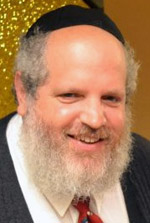Mikeitz (The End)

CARLSBAD, California — Today is the eighth, and obviously final day of Chanukah. As the sun sets tonight Chanukah merges into Shabbos. It is therefore incumbent upon us to seek a meaning in the juxtaposition of this auspicious holiday and this particular Shabbos.
As we know the holiday of Chanukah lasts for eight days. We Jews try to find a lesson in everything – particularly when it involves something as important as a holiday. The number eight has great significance in our belief system in that it represents the idea of going beyond nature. The seven days of the week represent the normal cycle of time. Even though we venerate the seventh day as Shabbos, it still falls within the realm of the natural cycle of time, as it happens weekly. We see this from the very beginning of time as recounted in Genesis.
Eight represents going one step beyond, indeed it is a step into the infinite. It is miraculous that human kind can reach beyond the physical limitations of time and space, especially since we are creations subjected to the limitations of a physical world. Yet that is precisely what a miracle is – it is a revelation of G-dliness that expands beyond the normal limitations of the laws of nature.
On Chanukah we celebrate numerous miracles. A correctly sealed jug of kosher olive oil was found despite the enemy’s best efforts to render unfit every drop of oil they could lay their hands upon. The oil that was enough to last one day in the Menorah lasted eight days instead. The Jewish Maccabean Army defeated the much more powerful Syrian Greeks. All of these instances demonstrate the laws of nature being overturned. This is why Chanukah was proclaimed a holiday.
With this in mind how is it possible to grow from Chanukah? How can we take the miraculous message and energy of the holiday and bring it into the natural cycle of time to which we are all subjected? It turns out that this portion serves as the perfect conduit for such a transition.
In the beginning of the portion we learn of Pharaoh’s dreams which are accurately interpreted by Joseph. Dreams are a recurring theme in Joseph’s life. He had dreams that were prophetic as we will find out. He correctly interpreted the dreams of the Chief Wine Steward and Chief Baker, and now, he again correctly interprets Pharaoh’s dreams. Incidentally not only did Joseph’s correct interpretation help Pharaoh, it saved the entire world, as Joseph wisely suggested the correct solution to the impending famine that imperiled the world.
The Rebbe, Rabbi Menachem Mendel Schneerson of blessed memory, discusses the significance of dreams. We dream when our conscious, rational mind, is at rest. During that time our power of imagination is no longer limited to the rational. That is why impossible things can occur in dreams.
We are currently living in a state of exile. We are not where we belong. The Holy Temple is only a memory. The nations of the world still cling to their irrational anti Semitism. Many Jews have drifted from the path of Torah and have embraced foreign ideologies and lifestyles. And yet we know that the Divine Presence, though hidden, is still here with us. These seem to be mutually exclusive concepts. G-d can be here yet be hidden. And, by the way, He is hidden by things that He Himself created and energizes. This is why exile is dreamlike.
In our portion along comes the righteous Joseph who can see through the dreams and find the truth even in the impossible.
And now we can understand the connection between Chanukah and specifically this portion. Chanukah is a clear-cut miracle. This portion is a resumption of the natural order, but with the addition of a sort of revelation of G-dliness within the mundane. That is a step up – the miraculous within the mundane! To have the infinite revealed through the finite is a metaphor of the ultimate target, which of course is the immediate arrival of our righteous Moshiach!
This miraculous coexistence of the supernatural within the natural is also alluded to by the name of this portion. Mikeitz, the End, is also a reference to the times when all of humanity will (finally) dwell together in peace and brotherhood and our people will be free to resume unfettered service of Almighty G-d within the Holy Temple. Not only will the nations not try to hinder this divine service – they will help facilitate it.
Wishing everyone a happy and HEALTHY Shabbos and Happy Chanukah!
*
Rabbi Yeruchem Eilfort is Director of Coastal Chabads and Chabad at La Costa. Rabbi Eilfort welcomes readers’ comments and questions and may be reached at RabbiE@ChabadatLaCosta.com.